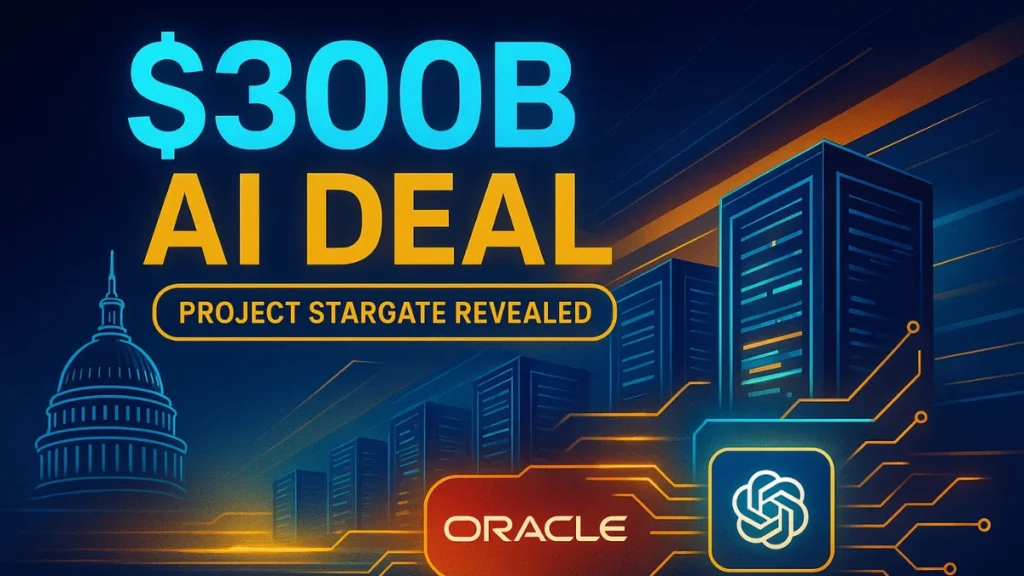OpenAI has struck a $300 billion deal with Oracle to build AI data centers across the U.S., cementing one of the largest infrastructure bets in tech history.
The pact, part of “Project Stargate,” will bankroll massive facilities powering artificial intelligence for businesses and governments — and it’s already moving dirt in Texas.
Key Takeaways
- OpenAI, Oracle commit $300B to AI data centers over five years.
- Deal covers more than half of OpenAI’s U.S. infrastructure goal.
- Oracle’s stock jumps after $317B in new contract revenue disclosed.
- Project Stargate could scale to $500B with global expansion.
- First facilities already under construction in Texas and UAE.
OpenAI has signed a $300 billion agreement with Oracle to construct some of the world’s largest artificial intelligence data centers, cementing one of the most ambitious infrastructure bets in technology to date. The multiyear pact, confirmed by people familiar with the matter, will fund facilities across the United States as part of OpenAI’s “Project Stargate” initiative.
The deal covers more than half of OpenAI’s U.S. infrastructure goal and represents a significant escalation in the race to secure computing power for training and deploying advanced AI models. Construction is already underway in Abilene, Texas, with additional sites expected to break ground over the next several years.

Oracle’s investors have reacted strongly. The company’s stock price surged more than 40 percent after it disclosed in a regulatory filing that it had added $317 billion in future contract revenue during its latest financial quarter. Analysts say the OpenAI partnership is a major driver of that increase, positioning Oracle as a stronger player in the hyperscale cloud market against rivals Amazon, Microsoft, and Google.
For OpenAI, the deal ensures it can access vast computing resources at a time when demand for large-scale AI infrastructure is exploding. The world’s biggest tech firms are projected to collectively spend more than $300 billion on data centers by the end of 2025. OpenAI and Oracle alone are now committing that much over just five years.
Project Stargate itself has been gaining momentum. In January, OpenAI joined Oracle and SoftBank in pledging at least $100 billion in U.S. infrastructure spending during an event with then-President Donald Trump. The initiative, which could eventually expand to $500 billion worldwide, reflects growing political pressure to keep advanced AI development anchored in the United States while also expanding into strategic markets abroad.
One of the most notable elements of the plan is its global reach. Alongside U.S. construction, OpenAI and Oracle are also moving forward with a massive computing complex in the United Arab Emirates. The UAE project is backed by a partnership that includes Oracle, SoftBank, and the Emirati AI company G42. Under a unique financing arrangement, G42 has pledged to match its Middle Eastern investment with an equivalent amount in U.S. facilities, suggesting that tens of billions of dollars will flow into both regions.
Industry observers say the scale of the Oracle-OpenAI pact is unprecedented. While cloud providers have long invested heavily in data centers, no single agreement has approached this level of spending. The partnership underscores how critical compute capacity has become not only for corporate strategy but also for national competitiveness in AI.
“This is a moonshot-level investment,” said one policy analyst. “It’s about far more than GPUs — it’s about who controls the backbone of the next economy.” Governments in Europe, Asia, and North America are closely watching the developments, mindful that AI infrastructure could soon be as strategically important as energy or defense.
The risks are equally large. Building and maintaining data centers at this scale will consume enormous amounts of energy, drawing scrutiny from environmental groups and regulators. The projects could also face geopolitical pushback, especially given the involvement of sovereign funds and strategic partners from the Middle East. Cost overruns, supply-chain constraints, or political shifts could further complicate the rollout.
Still, the companies appear intent on moving quickly. With shovels already in the ground in Texas and billions in committed financing, OpenAI and Oracle have signaled that this is not just a speculative announcement but a concrete race to build the power plants of the AI era.
For businesses and consumers, the impact may eventually be felt in the availability of more powerful AI services at scale, from enterprise tools to consumer apps. For Oracle, the deal represents a chance to leapfrog competitors by securing a central role in one of the most transformative technologies of the century. For OpenAI, it locks in the compute supply needed to stay ahead in the race to develop frontier AI models.
Conclusion, OpenAI and Oracle’s $300 billion commitment isn’t just another cloud contract. It is one of the boldest wagers in technology history, and it may well determine who controls the infrastructure behind artificial intelligence for the next generation.
Source from New York Times
Also Read…
